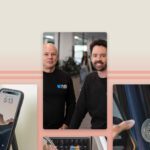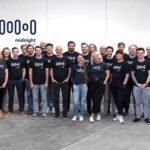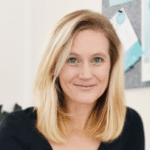Learning from mistakes and how to tackle the upcoming headwind

We know that mistakes propel us forward, but how do we make them recognize them and learn from them ss something, what the amazing speakers at inaugural “Business with Champions’ sponsored by AWS Startups are gonna talk about.
Christina is CEO at Verve and on a mission of building the financial power for women and passionate about ethical investment, impact investment, and ensuring that capital is used to help build a better world.
From the other side of the spectrum, we have Adam Milgrim, partner at Giant Leap, Australia’s first venture capital fund 100% dedicated to investing in impact startups whose mission is to back game changing founders, reimagining industries, and using business as a force for good.
And Nikita Le Messurier, the Startups Advisor at AWS assisting some of Australia’s most exciting startups to scale, innovate, and operate efficiently.

How do you define the mistakes in leadership?
Christina: The mistakes that you make as a leader are probably the worst ones. I think for me, the role of being the leader of an organisation is to set the vision, to communicate the strategy, and to essentially raise funds.
Of all of those, I think that if you don’t have a strong vision, you can’t attract the right people, you can’t maintain the right people, and you really can’t run the business in the right direction. I think errors in strategy are moveable and then when it comes to raising money, I think that’s probably where you can make the most detrimental mistakes.
I think it was Adam that once described it to me, that really the only mistakes you can’t recover from in business, and it was around poor shareholder agreements, poor agreements with co-founders. So luckily, I’ve never made those major mistakes, but I’ve made some pretty hilarious strategic mistakes along the way.
How do you deal with mistakes in VC land?
Adam: As a VC we have to be a really trusted, confident of our investee companies, and we have to accept that they’re gonna make mistakes and hold that and not hold it against them, because if entrepreneurs don’t feel safe coming to their VCs or their investors and talking honestly about the challenges in the businesses, you can’t have a strong relationship and you can’t build from that foundation.
So the first thing to realise is that mistakes are totally normal and fine and that entrepreneurs have to make mistakes that are inherent in their process, that they’re iterative, that they’re doing things that no one’s done before, by definition.
How much personal development stands in front of the mistakes?
Nikita: I know when I look at the different startups that I work with, you can see a marked difference in the businesses and how they operate from first time founders and second time founders.
And that’s because those second time founders have made the mistakes many times over. They’ve experienced running a business before. They know what the hurdles are, they know what the challenges are, they know how to see around some of those corners. And you see a foresight in them, that is a little bit more preventative.
But also what I can take from that, from working with so many different founders is some of those insights and I can see what works and what doesn’t, and I can help some of those first time founders, to see around the same corners they might not know exist yet. And so that’s the unique position that I get to sit in.
Christina: I think we’ve been on a really interesting journey of the business probably over the last six months, where we began to realise that the issues we were having or some of the issues we were having as a leadership team, but also further down into our executive team, were really these small things that kept coming up and up again.
And it was those sort of moments that make you uncomfortable working with your co-founder or uncomfortable in a way a staff member thinks about something or talks about something. But it was really in these smaller moments that weren’t being addressed properly. And so we’ve really been on this journey of actually bringing in a ‘radical feedback culture’ and really thinking about how do we do this in a really world leading way?
At Verve, we’re trying to work with all of our team members to be able to have pride, instant, honest, empathetic feedback and really training our staff and our team to be vulnerable and open to hearing it. Because what we were sort of finding is when these big things went wrong, they were often being caused by behaviours or ways of working that we could see in minor ways before those big moments were happening.
I feel like we’re in a really radical transformation as a business where it’s actually forced everyone to be a lot more open and vulnerable about the things that are going on in their minds that are impacting how they’re actually working.

What do you know now that you wish you knew when you started a business or earlier in your career?
Adam: The things that I’ve realised now, that I believe now, that I didn’t when I was starting my career, was to have a growth mindset.
And that actually these things are learned skills. So an abundance mentality and a growth mindset, are not an innate part of your psychology. And I came into the world thinking the business was the way business was and that it just existed to sell stuff. And the normal growth rate was 10 or 20% per annum.
And that’s just not true, right? That doesn’t have to be true! The beauty of working with startups is you get to create the world that you believe should exist. And so if you want a company that grows at 20% a month, you can create that world. If you want a company that doesn’t grow at all, you can create that world.
And the ability to have that kind of abundance mindset to say, I can create the world that I want to live in, is something that I wish I knew 20 years ago.
What’s the hardest decision you had to make and why?
Christina: The hardest thing I’ve gone through as a business and had to manage was actually having a baby about 14 months ago. And it’s just that really hard reality for women, but also for men. It’s like your prime fertility years knock and coincide with your prime career years and how the hell you manage that.
And I think going into that, I had heard all these stories of, you know, it’s fine. You have a baby, they sleep all the time, you’ll just get to pop some emails down, you’ll be fine…
It was extremely challenging and I think for me, the lesson for that, and I think it’s for men and women and sometimes it might even be harder for male co-founders because you don’t get that same empathy, but you’re still going through it at home – is really having to work on and really think through how to manage that. I would just recommend to anyone who’s got kids on their cards to really sit down, take it seriously, and work out a strategy.
What’s the biggest sacrifice you have made as a CEO or partner?
Adam: There’s always opportunity cost with decision making. And so I don’t think there’s a unique opportunity cost for being a partner at Giant Leap. But of course it limits what I can do. The primary thing for me, that change was before I was a partner at Giant Leap, I was a pretty active angel investor, and it’s very hard to be an angel investor and a full-time investor at a venture capital fund.
And so I had to choose for myself where my priorities lie. I assume for everyone, it is like you’re trading off family for work. And I’ve got three awesome kids and a beautiful wife. And definitely I can’t spend as much time with them as I want to because of work. But the work is so interesting and gives me so much purpose that the trade off makes sense. But I think everyone makes that trade off – It’s all work, but in a really good way!
Christina: I would say the biggest trade off that I didn’t really think about before I started a business was just that ability to actually turn off. I’ve had really big stressful jobs in the past, but could still normally come home and have some level of switch off, watch something omn Netflix and chill.
But I think having your own business, that switch off never really happens. It’s just a constant, whether it’s because you’re raising money and so you’re thinking about needing to fund the business or for me it’s normally just a million different ideas going through my head that I try to just write down in my notes and not instantly take action.

What do you think the Australian startup ecosystem can learn from other ecosystems more advanced?
Nikita: Firstly, I think our ecosystem is unique. We clearly have an incredible community here. Ecosystems like Silicon Valley, the ecosystem in London, New York… there are a couple of things that set them apart. The first one is they have an even stronger focus on community, which is so important, especially for underrepresented founders. We’re just going down that pathway at the moment. There are a number of initiatives to support female founders, which I’m really excited about personally!
And founders from indigenous communities, and more minority communities as well. But that’s still really nascent, in Australia. Another is the focus on hyper innovative investment. We’re a little bit safer in our investment here in Australia, and I think that is because our market is a little bit smaller.
If you look into the sheets over in New York and Berlin, there’s a lot more investment going into, especially from angel communities, high growth technologies like haptics, vr, robotics.
Where is VC land in Australia now, and where would you like it to be?
Adam: In terms of what’s happening in the VC landscape, certainly there’s a lot of money that’s pulled out as interest rates come up. A lot of the, what I would call ‘tourists investors’ or people who aren’t here as a career find other places to put their money. And so that’s definitely making it harder to raise money and taking investment rounds are taking longer.
Valuations are definitely lower. But I think it’s a reversion to the mean actually, I think we were a little bit hotheaded over the last couple of years and it wasn’t doing any service to founders or to the ecosystem, or to investors; because we’re playing the long game. For the companies that weren’t exiting over the last couple of years, their valuation was just one post on a very long road.
And if you end up with a too high evaluation early in your journey, it can really set you up for failure because you’ve kind of set the bar or the high water mark is too high. And so I actually think that we’re in a much better position at the moment and the companies that are getting funded are getting funded with investors who are there for the long term.

What kind of companies can survive the current markets, or the market in 2023?
Adam: I think all companies can survive. I think it’s easier for companies that are solving a problem that their customers really want to pay for, and that for me is like the test, right?
Can you charge more for your product, at this moment? I think it’s harder for companies that rely on raising a huge amount of capital with very limited attraction because investors don’t need to put their money there. They can put their money into slightly safer opportunities.
Christina: We were looking to raise $2.5M. We were oversubscribed, we’re about to close $3M. And we did it really quickly. And that was despite all these earlier warnings by people that were, it’s gonna be hard, it was gonna be long, prepare for the worst.
But the investors were straightaway on board because we’d be able to show strong traction. Not exceptional moonshot growth, but a good story of traction and growth. We had set our valuation always at fair, like fair levels hadn’t been over raised in previous rounds.
And so going into this round in this market, it looked like an attractive proposition. And suddenly your investors were way more interested in, can you cover your operating costs? What’s your runway gonna be with this investment? What does that kind of stable growth look like? So it was the opposite set of questions that we were having last time.
Any predictions for 2023?
Adam: I don’t wanna be too pessimistic, but I think next year’s gonna continue to be tough. I don’t think that the economic environment is going to change quickly. I think we’re gonna continue to see interest rates increase. I think we’re gonna continue to, which will inherently force valuations to continue to go down. And companies have to be leaner, and more selective.
The optimist in me, which you can’t be a venture capitalist and not be optimistic, is that that will build more resilient companies and that will build companies with better core economics. In terms of trends, what we’re seeing, certainly health, is a massive focus area, as is education.
And excitingly, the climate is right in its prime. And I think that there’s a lot of optimism given the current government policies that we’ve got, we’ll see a lot of innovation in that space.



Related posts

Visionary Behind the Bionic Ear Honoured in 2024 Pause Awards Hall of Fame
3 December, 2024

Australia’s boldest innovators announced and new chapter for 2025
3 December, 2024

Top five winners score the most invaluable encounter
19 November, 2024

How Ally Watson is pioneering tech careers for women
15 November, 2024

Breakthrough Insights, Strategies, Creativity and Culture for now
12 November, 2024

Life lessons on ownership and how to keep creative control
6 November, 2024

How to unlock the intangible in brand equity with 4P’s
29 October, 2024

Discover trailblazing Finalists of Pause Awards 2024 in Australia
28 October, 2024

Why Bunnings feels like home: trust, community and genuine care
23 October, 2024

Why creativity and imagination will save the world
22 October, 2024

How Canva transformed a simple idea to become global leader
15 October, 2024

How NASA’s new AR tech will take astronauts to the next frontier
11 October, 2024

How to build authentic workplace culture
7 October, 2024

How to balance business growth with personal wealth
24 September, 2024

A time to dream big with Kristina Karlsson
16 September, 2024

The purpose of gatekeepers in authentic brand storytelling
6 September, 2024

It’s here, a final call to enter the Pause Awards this year
3 September, 2024

Join a free 7-week online learning on the go
3 September, 2024

Pause Awards partners with Ticker for exclusive broadcast coverage
6 August, 2024

Calling Melbourne — a significant player to enter!
6 August, 2024

Calling Hobart — an emerging hub to enter!
26 July, 2024

Calling Canberra — with most daring new ideas to enter!
16 July, 2024

Meet final judges and why they love Pause Awards
15 July, 2024

Meet even more judges and why they love Pause Awards
8 July, 2024

Meet more judges and why they love Pause Awards
5 July, 2024

Calling Adelaide — dynamic centre for innovation to enter
4 July, 2024

Meet the judges and why they love Pause Awards
1 July, 2024

Maybe those shouldn’t have been there in the first place
27 June, 2024

Calling Perth — an emerging innovator to enter!
25 June, 2024

Read a thrilling mid year predictions by the judges
24 June, 2024

Jasmine Batra’s Breakthrough Moment
24 June, 2024

WithYouWithMe’s Breakthrough Moment
24 June, 2024

Paz Pisarski’s Breakthrough Moment
20 June, 2024

UpStock’s Breakthrough Moment
20 June, 2024

Calling Brisbane — a rising star to enter!
19 June, 2024

How to choose the right category for the Pause Awards?
17 June, 2024

Success stories of past Pause winners
17 June, 2024

Your guide to the Pause Awards entry process
17 June, 2024

Understanding the breakthrough question
17 June, 2024

Top 10 tips on how to enter Pause Awards
17 June, 2024

Calling Sydney — a powerhouse of opportunity to enter!
6 June, 2024

Inke’s Breakthrough Moment
6 June, 2024

ReSource’s Breakthrough Moment
3 June, 2024

Brittany Garbutt’s exchange with Paul Bassat on building and sustaining a business empire
21 May, 2024

Entering Pause Awards for the first time?
21 May, 2024

Inside the Pause Awards 2024: A universe of possibility
14 May, 2024

What’s a Pause Awards breakthrough?
14 May, 2024

Marcella Romero’s Breakthrough Moment
9 May, 2024

Music Health’s Breakthrough Moment
2 May, 2024

Chau Le’s Breakthrough Moment
30 April, 2024

Tanck’s Breakthrough Moment
26 April, 2024

Macro Mike’s Breakthrough Moment
23 April, 2024

Birchal’s Breakthrough Moment
18 April, 2024

Tixel’s Breakthrough Moment
16 April, 2024

Redefining success with Angus and Neil of Tanck
15 April, 2024

Quad Lock’s Breakthrough Moment
12 April, 2024

Origin Energy’s Breakthrough Moment
10 April, 2024

Mel Stubbing’s breakthrough moment
5 April, 2024

Brittany Garbutt’s breakthrough moment
2 April, 2024

InvestorHub’s Breakthrough Moment
28 March, 2024

Kollektive’s Breakthrough Moment
26 March, 2024

Talking robots and AI Agents, two insane demos
25 March, 2024

Fight Club and Zombie VCs
25 March, 2024

WeMoney’s breakthrough moment
20 March, 2024

Addressing gender inequality with 21.7% discount for female-led companies
8 March, 2024

How Entertainment Brands are winning hearts and minds
5 March, 2024

2023 packed a punch
17 January, 2024

The power of relationships with Dom Pym at Pause Awards Night
19 December, 2023

Six years of celebrating the Australian most ambitious innovators
5 December, 2023

M&A green shoots & scandal central
10 November, 2023

Announcing the 63 ambitious finalists, 3 winners and Pause Awards Night
30 October, 2023

Can optimism and curiosity win the battle with Ai
20 October, 2023

Looking at 100 years from now in Solar, EVs and MedTech
20 October, 2023

What does the Australia’s VC landscape look like in 2050
19 October, 2023

Do we want to live in a Black Mirror world?
17 October, 2023

Four new emerging directors envision sustainable future beyond 2050
6 October, 2023

Visible Founders puts a spotlight on migrant entrepreneurs
28 September, 2023

Always be closing & IPO, no?
24 September, 2023

Strong commitment needed to run tech events in Australia revealed at GEC23
24 September, 2023

iPhone 15 event: everything about Apple’s new product line
14 September, 2023

Discover the colourful world of oral hygiene with Dsmile’s new range
13 September, 2023

How to build a company culture in dynamic market
8 September, 2023

The valuable startup lessons hidden in the film Oppenheimer
7 September, 2023

Meet the new addition to the Judging Board ‘23
4 September, 2023

Advice on Design Thinking for stellar product development
1 September, 2023

How Pause Awards can put your brand on the map
30 August, 2023

Seize the moment: New Extended Entry Deadline
30 August, 2023

I got 99 problems
26 August, 2023

Is AI the new frontier of creativity and business
25 August, 2023

Tech legends unite to guide growth and foster innovation
22 August, 2023

The new faces of Pause Awards in business and the product officers
21 August, 2023

Don’t miss out on the last chance to join champions
21 August, 2023

Experience is a new frontier for brands
18 August, 2023

How to grow an idea into a great product
11 August, 2023

Good storytelling and trust will fuel startup and brand growth
4 August, 2023

Twitter to X: a rebrand to challenge tech giants and empower users
4 August, 2023

Discover the latest tech predictions of 2023
1 August, 2023

Elevate your business with Stephen Hunt’s success secrets
31 July, 2023

Lean into digital marketing trends now and in 2024
28 July, 2023

The new faces of Pause Awards from agency and media innovation
25 July, 2023

Hit it, DJ! and other local newsings
24 July, 2023

Female-led ethical fintech Verve raises $3M for Verve Money
21 July, 2023

How to better tune into your success journey
21 July, 2023

Pause Fest’s BREAK–THROUGH SESSIONS will keep you scaling
12 July, 2023

How to choose the right awards for your business
5 July, 2023

The new faces of Pause Awards in strategy and leadership
4 July, 2023

We’re building the community for the most ambitious people
27 June, 2023

It was worth waiting for these unique features
26 June, 2023

Mapping the future of fit and function
23 June, 2023

Midnight Health secures $24 million funding boost
21 June, 2023

Championing breakthroughs in today’s business world
21 June, 2023

OpenAI’s Sam Altman says hai
19 June, 2023

Top 5 compelling reasons why you should enter
18 June, 2023

Pause Awards vs Webby’s, Cannes Lions and Effies
18 June, 2023

The new faces of Pause Awards in startup, product and experience
15 June, 2023

A tour of 11 new categories
12 June, 2023

Inside out of Pause Awards
5 June, 2023

Aim for the Diamond: Understanding the Different Categories
1 June, 2023

The new faces of Pause Awards in strategy, growth and innovation
30 May, 2023

Where business recognition gets a paradigm shift
24 May, 2023

Industry leaders predict a transformative year ahead
17 May, 2023

Pause Awards grows to $412 Billion ecosystem
17 May, 2023

Shaking it up with new Investable Score™
17 May, 2023

Tap into your inner powerhouse
5 May, 2023

Life in the fast (tech) lane
24 April, 2023

evee rides the electric wave
18 April, 2023

Big win for the female-led business Circle In, lands $2 Million
14 April, 2023

Designing global empires:
How local brands can conquer the world
10 April, 2023

A passionate pursuit for Healthcare reinvention
4 April, 2023

The game-changing sessions at SXSW Sydney
30 March, 2023

Top AI tools you need to try now
29 March, 2023

A journey to revolutionising healthy school lunches
28 March, 2023

Panic! at the SVB & metrics that matter
16 March, 2023

Call for Entries
opens on 17 May ‘23
1 March, 2023

Startup funding in decline, but early-stage hits peak in Aus
10 February, 2023

Music for wellbeing:
The healing power of sound
20 January, 2023

Deep dive with ChatGPT about Aussie tech ecosystem
17 January, 2023

How it started; How it’s going 2022
17 December, 2022

Claiming your PauseNFT trophy
13 December, 2022

Women and purpose led businesses take the most wins at Pause Awards ‘22
6 December, 2022

Professor Fiona Wood – The pioneer of ‘Spray-on-Skin’ technique, ReCell.
6 December, 2022

Rise and Demise
28 November, 2022

Let’s have breakfast with champions?
15 November, 2022

82 Bold Finalists Announced for the Pause Awards ‘22
10 November, 2022

Judge Sessions with Lumigo, Tribal DDB and Clipboard Hospitality
24 October, 2022

Judge Sessions with LongView, Fullstack and Art Processors
20 October, 2022

The first look at the new wearable trophy design
13 October, 2022

The Public Voting is open, go get them!
10 October, 2022

Cash to splash & other VC news
2 October, 2022

The Final Deadline Extended to midnight 14 October
30 September, 2022

Judge Sessions with Wavia, SEIKK and MedTech Actuator
26 September, 2022

Pause Awards Wins Australia’s International Good Design Awards for Design Excellence
19 September, 2022

Judge Sessions with Synergy Group, AOK Creative and i4 Connect
16 September, 2022

A word with Birchal’s Co-Founder – Matt Vitale
6 September, 2022

What can Pause Awards bring to your company
30 August, 2022

Google, Synergy Group, Spaces Interactive, Safari and By Jacs judges for Culture categories
24 August, 2022

Loyal VC, Media.Monks, AOK Creative, Storyfolk and Irene Lemon judges for Good categories
15 August, 2022

Fullstack, Lumigo, Netambition, MedTech Actuator and Unhedged judges for Operators categories
10 August, 2022

A word with Heaps Normal’s Head of Brand – Peter Brennan
9 August, 2022

Tribal DDB, We Are Unity, Bullfrog, BeautifulAgile and The Audacious Agency judges for your Excellence
2 August, 2022

Simply Wall Street, IBM, Forestlyn, CFOWorx and Accenture Song are this year Growth Judges
1 August, 2022

Venture snapshot: down but not out
26 July, 2022

Best equity crowdfunding year in Australia – $86m!
22 July, 2022

How to navigate the awards Entry Portal?
14 July, 2022

Startup Genome ecosystem report 2022 review
10 July, 2022

We’re giving a voice to our community with a stylish newsroom design
10 July, 2022

Professor Martin Green
– The father of solar cells
10 July, 2022

Dr John O’Sullivan
– The inventor of modern WiFi
10 July, 2022

14 New award categories under five tracks to highlight the ecosystem success
5 July, 2022

M&A on the rise & the EV SPAC demise
29 June, 2022

Our new vision:
The home for champions
27 June, 2022

Awards LIVE Briefing and Entry Kit
22 June, 2022

The Porsche of awards programmes with community at its heart
21 June, 2022

The Sheet Society
– Success Stories
17 June, 2022

We’re looking for our final few judges – could you be one?
8 June, 2022

Single Use Ain’t Sexy
– Success Stories
1 June, 2022

Afterpay
– Success Stories
24 May, 2022

This is how we celebrate innovation champions
15 December, 2021

The most ambitious and forward-thinking companies in Australia revealed
24 November, 2021

Pause Awards 2021 Finalists Skyrocket
17 November, 2021

Final Deadline is Looming
1 September, 2021

Get to know:
Carolyn Breeze – Judge
24 August, 2021

Get to know:
Will Hayward – Judge
17 August, 2021

Get to know:
Shamila Gopalan – Judge
10 August, 2021

Get to know:
Tom Leyden – Judge
3 August, 2021

Get to know:
Jules Brooke – Judge
26 July, 2021

Get to know:
Jamie Finnegan – Judge
18 July, 2021

Early Entries end This Week
12 July, 2021

Need Help Entering Pause Awards?
6 July, 2021

2021 Award Category Guide
1 July, 2021

How to Enter The Pause Awards in 7 min?
25 June, 2021

Get to know:
Melanie Rayment – Judge
24 June, 2021

Past winners:
where are they now?
24 June, 2021

Pause Awards 2021 opens for entries
9 June, 2021

New categories revealed for Pause Awards 2021
5 June, 2021

Meet the Judging Board 2021
13 May, 2021

The Reign in the North
1 February, 2021

What went into creating Vincent, a hyper-real digital human
21 January, 2020

Dane O’Shanassy on Patagonia’s moral compass and commercial success
6 November, 2019
Pause index

Jasmine Batra
Future Builder

Circle In
Circular Pioneer

Atticus
Small & Mighty Culture, Going Global

inke Packaging
Design First

Honeycomb Strategy
Work Sweet Work

WithYouWithMe
Out Of The Garage

Mr Yum
Hammer, Work Sweet Work, Defiant Ones

Chau Le
Women In Business

Heaps Normal
I Wish I'd Done That, Hammer

Swoop Aero
B-Good

Law On Earth
B-Good


